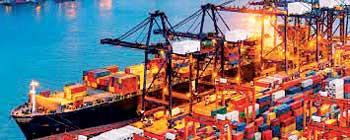02 Jan 2024 - {{hitsCtrl.values.hits}}
By Nishal Fernando
 Sri Lanka’s exporters face a 40-50 percent hike in freight rates and space shortages, as global shipping companies move to reroute their vessels around the Cape of Good Hope. This is to avoid disruption to shipments after the recent attacks on vessels in the Red Sea by the Yemeni Houthi militant group.
Sri Lanka’s exporters face a 40-50 percent hike in freight rates and space shortages, as global shipping companies move to reroute their vessels around the Cape of Good Hope. This is to avoid disruption to shipments after the recent attacks on vessels in the Red Sea by the Yemeni Houthi militant group.
“There’s a push on rates upwards along some with space issues, due to uncertainty. It’s actually feasible for them to go directly from Singapore to the Cape of Good Hope, instead of stopping in Colombo. Some ships are opting for this, which has triggered space issues for exporters in Colombo,” a shipping industry expert told Mirror Business.
He noted that the freight rates have increased significantly after hitting record lows in November last year.
“We see an increase. However, the freight rates remain low compared to one and a half years ago. Before this recent surge, the freight rates were only 10 percent of what it was one and a half years ago,” he said, noting that the exporters would pass this increase to the retailers, who would ultimately pass it on to the consumers.
According to the estimates from the freight platform Xeneta, the longer journey avoiding the Red Sea and Suez Canal cost up to US $ 1 million extra in fuel for every round trip between Asia and Northern Europe while adding 10 days to the journey.
Meanwhile, the industry expert, who preferred to remain anonymous, said that some exporters may find delays in finding space for their cargo, as the number of vessels calling for Colombo has reduced.
“Majority of vessals are still calling the Port of Colombo and going around the Cape of Good Hope. However, even when some don’t come, it affects the space. It’s not as if you can’t find space for your cargo at all; you have to book early to secure the space,” he elaborated.
Despite the reduction in the number of vassals calling the Port of Colombo, the experts expect a minimal impact on transshipment volumes at the port.
28 Oct 2024 51 minute ago
28 Oct 2024 59 minute ago
28 Oct 2024 2 hours ago
28 Oct 2024 4 hours ago
28 Oct 2024 4 hours ago